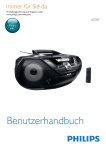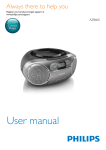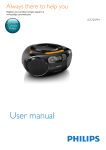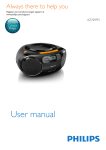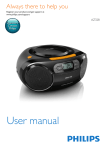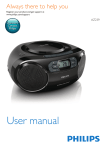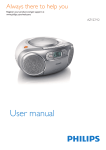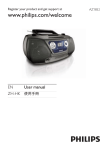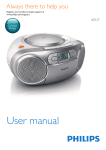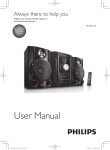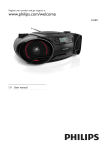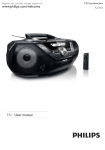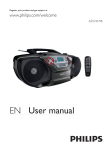Download Philips CD Soundmachine AZ787
Transcript
Always there to help you Register your product and get support at www.philips.com/welcome Question? Contact Philips User Manual AZ787 Contents 1Important 3 Risk of swallowing batteries 4 2 Your CD Soundmachine 4 Introduction4 What's in the box 4 Overview of the main unit 5 Overview of the remote control 6 3 Get started 7 4Play 8 Prepare the remote control Connect power Turn on Turn off Play CD Play from USB devices Play from an external device Play tape 6 Listen to FM radio 11 7 Other features 12 Set the sleep timer Turn screen backlight on/off Listen through the headphone 9Troubleshooting 14 10Notice 15 8 8 9 9 10 Tune to FM radio stations Store radio stations automatically Store radio stations manually Select a preset radio station 12 Specifications 12 13 Supported MP3 disc formats USB playability information 13 Maintenance13 7 7 8 8 5 Play options Control play Program tracks Adjust sound 8 Product information 10 10 10 11 11 11 11 12 12 12 EN 2 1Important • • • • • • • • • • • • 3 Read these instructions. Follow all instructions. Do not block any ventilation openings. Install in accordance with the manufacturer's instructions. Do not install near any heat sources such as radiators, heat registers, stoves, or other apparatus (including amplifiers) that produce heat. Protect the power cord from being walked on or pinched, particularly at plugs, convenience receptacles, and the point where they exit from the unit. Only use attachments/accessories specified by the manufacturer. Unplug this unit during lightning storms or when unused for long periods of time. Refer all servicing to qualified service personnel. Servicing is required when the unit has been damaged in any way, such as power-supply cord or plug is damaged, liquid has been spilled or objects have fallen into the apparatus, the unit has been exposed to rain or moisture, does not operate normally, or has been dropped. Battery usage CAUTION – To prevent battery leakage which may result in bodily injury, property damage, or damage to the unit: • Install all batteries correctly, + and - as marked on the unit. • Do not mix batteries (old and new or carbon and alkaline, etc.). • Remove batteries when the unit is not used for a long time. Batteries (battery pack or batteries installed) shall not be exposed to excessive heat such as sunshine, fire or the like. CAUTION: Danger of explosion if battery is incorrectly replaced. Replace only with the same or equivalent type. The unit shall not be exposed to dripping or splashing. EN • • Do not place any sources of danger on the unit (e.g. liquid filled objects, lighted candles). Where the MAINS plug or an appliance coupler is used as the disconnect device, the disconnect device shall remain readily operable. Warning •• Never remove the casing of this apparatus. •• Never place this apparatus on other electrical equipment. •• Never look into the laser beam inside this apparatus. Hearing safety Caution •• To prevent possible hearing damage, do not listen at high volume levels for long periods. Set the volume to a safe level. The louder the volume, the shorter is the safe listening time. Be sure to observe the following guidelines when using your headphones. • Listen at reasonable volumes for reasonable periods of time. • Be careful not to adjust the volume continuously upwards as your hearing adapts. • Do not turn up the volume so high that you can’t hear what’s around you. • You should use caution or temporarily discontinue use in potentially hazardous situations. • Excessive sound pressure from earphones and headphones can cause hearing loss. Caution •• Use of controls or adjustments or performance of procedures other than herein may result in hazardous radiation exposure or other unsafe operation. Risk of swallowing batteries • • • • The product or remote control may contain a button cell battery, which is possible to be swallowed. Keep the battery out of reach of children at all times! If swallowed, the battery can cause serious injury or death. Severe internal burns can occur within two hours of ingestion. If you suspect that a battery has been swallowed or placed inside any part of the body, seek immediate medical attention. When you change the batteries, always keep all new and used batteries out of reach of children. Ensure that the battery compartment is completely secure after you replace the battery. If the battery compartment cannot be completely secured, discontinue use of the product. Keep out of reach of children and contact the manufacturer. 2 Your CD Soundmachine Introduction With this CD Soundmachine, you can: • listen to FM radio; • enjoy audio from discs, tapes, USB storage device, and other external audio devices; and • program the play sequence of tracks. The unit offers you Dynamic Bass Boost (DBB) and Digital Sound Control (DSC) to enrich sound. What's in the box Check and identify the contents of the package: • Main unit • AC power cord • Remote control (with battery) • Quick start guide • Safety sheet EN 4 Overview of the main unit a b c d r q p e f g h o n m l i j k a FM antenna • Improve FM reception. i MODE • Select a play mode: repeat or shuffle. b j SOURCE • Select a source. • Headphone socket. c AUDIO-IN • Connect an external audio device. k d l DBB • Turn dynamic bass boost on/off. e f • Turn the unit on/off. • Stop play. • Erase a program. / TUNING +/• Skip to the previous or next track. • Tune to FM radio stations. • Search within a track. g ALBUM/PRESET -/+ • Select a preset radio station. • Skip to the previous or next album. h PROG • Program tracks. 5 EN • USB socket. m DSC • Select a preset sound setting. n VOL +/• Adjust volume. o • Start or pause play. p Display panel • Display current status. q Tape controls • Start tape play. • / Fast rewind or fast forward the tape. • • Stop tape play or open the tape door. Pause tape play. r OPEN•CLOSE • Open or close the disc compartment. Overview of the remote control a CD TUNER / • Search within a track. e PROG • Program radio stations. • Program tracks. f REPEAT • Select repeat play mode. g SHUFFLE • Select shuffle play mode. h DBB • Turn dynamic bass boost on or off. i DSC • Select a preset sound setting. USB j VOL +/• Adjust volume. b n c d e d m l PROG SLEEP MUTE BACKLIGHT f REPEAT g SHUFFLE h DBB k MUTE • Mute or restore sound. l SLEEP/BACKLIGHT • Set sleep timer. • Turn the backlight on or off. m k VOL j DSC i n • Stop play. • Erase a program. / • Skip to the previous or next track. a Source selector: CD, TUNER, USB • Select a source. b c / • Skip to the previous or next album. • Select a preset radio station. • Start or pause play. EN 6 3 Get started Option 1: AC power Warning Caution •• Use of controls or adjustments or performance of procedures other than herein may result in hazardous radiation exposure or other unsafe operation. Always follow the instructions in this chapter in sequence. If you contact Philips, you will be asked for the model and serial number of your apparatus. The model number and serial number are on the bottom of your apparatus. Write the numbers here: Model No. __________________________ Serial No. ___________________________ •• Risk of product damage! Make sure that the power supply voltage corresponds to the voltage printed on the back or the underside of the unit. •• Risk of electric shock! When you disconnect the AC power, always pull the plug from the socket. Never pull the cord. Connect the AC power cord to: • the AC~ MAINS socket on the unit. • the wall socket. Tip •• To save energy, turn the unit off after use. Prepare the remote control For first-time use: Remove the protective tab to activate the remote control battery. To replace the exhausted battery: 1 2 Open the battery tray. Insert one CR2025 battery with correct polarity (+/-) as indicated. Option 2: Battery power Caution •• Batteries contain chemical substances, so they should be disposed of properly. 3 Close the battery tray. Connect power The unit can be powered by either AC power or batteries. 7 EN Note •• Batteries are not supplied with the accessories. 1 2 Open the battery compartment. Insert 6 batteries (type: R-20, UM-1 or D-cells) with correct polarity (+/-) as indicated. 3 Close the battery compartment. 4Play Play CD 1 2 3 Press CD to select the disc source. Press OPEN•CLOSE to open the disc tray. Insert a disc with the printed side facing up, then close the disc tray. »» Play starts automatically. Turn on Press . »» The unit switches to the last selected source. Tip •• To select a source, press SOURCE repeatedly or the source selection buttons on the remote control. Play from USB devices Turn off Press again. »» The backlight on the display panel turns off. Note •• Make sure that the USB device contains playable audio content. 1 2 Press USB to select USB source. Insert the USB device into the socket. »» Play starts automatically. If not, press . EN 8 Play tape Note •• When you play a tape, the sound source cannot be changed. 1 2 3 4 Play from an external device You can also listen to an external audio device such as an MP3 player through this unit. 1 2 3 9 Press SOURCE repeatedly to select [AUDIO-IN] source. Connect an audio cable (3.5mm, not supplied) to: • the AUDIO-IN socket on the unit. • the headphone socket on an external device. Play the external device (see the device's user manual). EN Press SOURCE to select the tape source. Press to open the tape door. Load a tape with the open side upward. Press to start play. • To pause or resume play, press . • To rewind or fast-forward, press / . • To stop play, press . 5 Play options Program tracks In CD or USB mode, you can program a maximum of 20 tracks. Control play In CD or USB mode, you can control play through the following operations. / / / REPEAT SHUFFLE Press and hold to fast-forward or fast-reverse the track during playback, then release to resume play. Skip to the previous or next MP3/ WMA album. Select an audio file. Start or pause play. Stop play. [ ]: Play the current track repeatedly. [ ]: Play all tracks repeatedly. [ ]: Repeat all tracks randomly. To return to normal play, press REPEAT repeatedly until the repeat icons disappear. [ ]: Play tracks randomly. To return to normal play, press SHUFFLE repeatedly until the shuffle icon disappear. Tip 1 2 3 4 5 6 Press to stop playback. Press PROG to activate the program mode. »» [PROG] (program) begin to blink. For MP3/WMA tracks, press ALBUM/ PRESET +/- to select an album. Press / to select a track number, then press PROG to confirm. Repeat steps 3-4 to program more tracks. Press to play the programmed tracks. »» During play, [PROG] (program) is displayed. • To erase the program, press twice. Adjust sound During play, you can adjust volume and select the sound effects. Key VOL +/MUTE DBB DSC Function Increase or decrease volume. Mute or resume sound. Turn dynamic bass enhancement on or off. Select a preset sound effect: ROCK (rock); CLASSIC (classic); POP (pop); JAZZ (jazz) •• Only [ ] and [ ] can be selected when you play the programmed tracks. EN 10 6 Listen to FM radio Store radio stations manually Note •• You can program a maximum of 30 FM radio stations. Tune to FM radio stations Note 1 2 •• For optimal reception, fully extend and adjust the position of the FM antenna. indicates stereo broadcast is available for this radio station. •• The icon 1 2 3 Press TUNER to select FM radio. Press and hold / for 2 seconds. »» [SEARCH] (search) is displayed. »» The unit tunes to a station with strong reception automatically. Repeat step 2 to tune to more stations. To tune to a radio station with weak signal: Press / repeatedly until you find better reception. Store radio stations automatically Note •• You can program a maximum of 30 FM radio stations. In tuner mode, press and hold PROG for 2 seconds. »» [AUTO STORE] (auto store) is displayed. »» The unit stores all the available FM radio stations. »» The first stored radio station is broadcast automatically. 11 3 EN 4 Tune to an FM radio station. Press PROG to activate the storing mode. »» [PROG] (program) blinks on the display. Press to allocate a number (1 to 30) to this radio station, then press PROG to confirm. »» The preset number and the frequency of the preset station are displayed. Repeat the above steps to store other stations. Note •• To remove a pre-stored FM radio station, store another station in its place. Select a preset radio station In FM tuner mode, press number. to select a preset 7 Other features 8Product information Set the sleep timer This unit can switch to standby automatically after a preset period. • When the unit is turned on, press SLEEP repeatedly to select the sleep timer period (in minutes). »» When the sleep timer is activated, appears. To deactivate sleep timer: • Press SLEEP repeatedly until [SLEEP OFF] (sleep off) is displayed. »» When the sleep timer is deactivated, disappears. Turn screen backlight on/off Press and hold BACKLIGHT for 2 seconds. Listen through the headphone Plug a headphone into the socket on the unit. Note •• Product information is subject to change without prior notice. Specifications Amplifier Max Output Power Frequency Response Signal to Noise Ratio Total Harmonic Distortion Audio-in Input Total 12 W 125 -16000 Hz, -3dB >55 dBA <1 % 650 mV RMS Disc Laser Type Disc Diameter Support Disc Audio DAC Total Harmonic Distortion Frequency Response S/N Ratio Semiconductor 12cm/8cm CD-DA, CD-R, CD-RW, MP3-CD, WMA-CD 24Bits / 44.1kHz <1% 125 -16000 Hz, -3dB >55 dBA Tuner Tuning Range Tuning grid Total Harmonic Distortion Signal to Noise Ratio 87.5 - 108MHz 50 kHz <3% >50 dBA EN 12 Tape deck Frequency response - Normal tape (type I) Signal-to-noise ratio - Normal tape (type I) Wow and flutter 125 - 8000 Hz (8 dB) 35 dBA ≤ 0.4% DIN General Power supply - AC Power - Battery Operation Power Consumption Standby Power Consumption Dimensions - Main Unit (W x H x D) Weight (Main Unit) 220-240V~, 50/60 Hz; 9 V, 6 x 1.5 V Size "D"/ R20 CELL 15 W <0.5 W 435 x 170 x 271 mm 3 kg Supported MP3 disc formats • • • • • ISO9660, Joliet Maximum title number: 512 (depending on file name length) Maximum album number: 255 Supported sampling frequencies: 32 kHz, 44.1kHz, 48 kHz Supported Bit-rates: 32~256 (kbps), variable bit rates USB playability information Compatible USB devices: • USB flash memory (USB 2.0 or USB1.1) • USB flash players (USB 2.0 or USB1.1) • memory cards (requires an additional card reader to work with this apparatus) 13 EN Supported formats: • USB or memory file format FAT12, FAT16, FAT32 (sector size: 512 bytes) • MP3 bit rate (data rate): 32-320 Kbps and variable bit rate • WMA v9 or earlier • Directory nesting up to a maximum of 8 levels • Number of albums/ folders: maximum 99 • Number of tracks/titles: maximum 999 • ID3 tag v2.0 or later • File name in Unicode UTF8 (maximum length: 128 bytes) Unsupported formats: • Empty albums: an empty album is an album that does not contain MP3/WMA files, and is not be shown in the display. • Unsupported file formats are skipped. For example, Word documents (.doc) or MP3 files with extension .dlf are ignored and not played. • AAC, WAV, PCM audio files • DRM protected WMA files (.wav, .m4a, .m4p, .mp4, .aac) • WMA files in Lossless format Maintenance Clean the cabinet • Use a soft cloth slightly moistened with a mild detergent solution. Do not use a solution containing alcohol, spirits, ammonia or abrasives. Clean discs • When a disc becomes dirty, clean it with a cleaning cloth. Wipe the disc from the centre out. • Do not use solvents such as benzene, thinner, commercially available cleaners, or antistatic spray intended for analogue records. Clean the disc lens • After prolonged use, dirt or dust may accumulate at the disc lens. To ensure good play quality, clean the disc lens with Philips CD lens cleaner or any commercially available cleaner. Follow the instructions supplied with cleaner. Clean the heads and the tape paths • To ensure good play quality, clean the heads A, the capstan(s) B, and pressure roller(s) C after every 50 hours of tape operation. • Use a cotton swab slightly moistened with cleaning fluid or alcohol. • You can also clean the heads by playing a cleaning tape once. Demagnetise the heads • Use a demagnetising tape available at your dealer. 9Troubleshooting Warning •• Never remove the casing of this device. To keep the warranty valid, never try to repair the system yourself. If you encounter problems when using this device, check the following points before requesting service. If the problem remains unsolved, go to the Philips Web page (www.philips.com/support). When you contact Philips, make sure that the device is nearby and the model number and serial number are available. No power • Ensure that the Mains cord is connected securely. • Ensure that there is power at the AC Mains. • Ensure that the batteries are inserted correctly. No sound or poor sound •• Adjust the volume. No response from the unit •• Disconnect and reconnect the AC power plug, then turn on the system again. •• As a power-saving feature, the unit switches off automatically 15 minutes after track play reaches the end and no control is operated. Poor cassette sound quality • Make sure that heads in the cassette holder are clean. Remote control does not work •• Before you press any function button, first select the correct source with the remote control instead of the main unit. •• Reduce the distance between the remote control and the unit. •• Insert the battery with its polarities (+/– signs) aligned as indicated. EN 14 •• •• Replace the battery. Aim the remote control directly at the sensor on the front of the unit. 10Notice USB device not supported •• The USB device is incompatible with the apparatus. Try another one. No disc detected •• Insert a disc. •• Check if the disc is inserted upside down. •• Wait until the moisture condensation at the lens has cleared. •• Replace or clean the disc. •• Use a finalized CD or correct format disc. Poor radio reception •• Increase the distance between the unit and your TV or VCR. •• Fully extend the FM antenna. This product complies with the radio interference requirements of the European Community. Any changes or modifications made to this device that are not expressly approved by Philips Consumer Lifestyle may void the user’s authority to operate the equipment. Your product is designed and manufactured with high quality materials and components, which can be recycled and reused. When this crossed-out wheeled bin symbol is attached to a product it means that the product is covered by the European Directive 2002/96/ EC. Please inform yourself about the local separate collection system for electrical and electronic products. Please act according to your local rules and do not dispose of your old products with your normal household waste. Correct disposal of your old product helps to prevent potential negative consequences for the environment and human health. Your product contains batteries covered by the European Directive 2006/66/EC, which cannot be disposed with normal household waste.Please inform yourself about the local rules on separate collection of batteries 15 EN because correct disposal helps to prevent negative consequences for the environmental and human health. Environmental information All unnecessary packaging has been omitted. We have tried to make the packaging easy to separate into three materials: cardboard (box), paper pulp (buffer) and polyethylene (bags, protective foam sheet.) Your system consists of materials which can be recycled and reused if disassembled by a specialized company. Please observe the local regulations regarding the disposal of packaging materials, exhausted batteries and old equipment. Windows Media and the Windows logo are trademarks, or registered trademarks of Microsoft Corporation in the United States and/or other countries. Note •• The type plate is located on the bottom of the apparatus. This apparatus includes these labels: Class II equipment symbol This symbol indicates that the apparatus has a double insulation system. The making of unauthorized copies of copyprotected material, including computer programs, files, broadcasts and sound recordings, may be an infringement of copyrights and constitute a criminal offence. This equipment should not be used for such purposes. The USB-IF Logos are trademarks of Universal Serial Bus Implementers Forum, Inc. EN 16 Specifications are subject to change without notice © 2012 Koninklijke Philips Electronics N.V. All rights reserved. AZ787_12_UM_V1.1

















